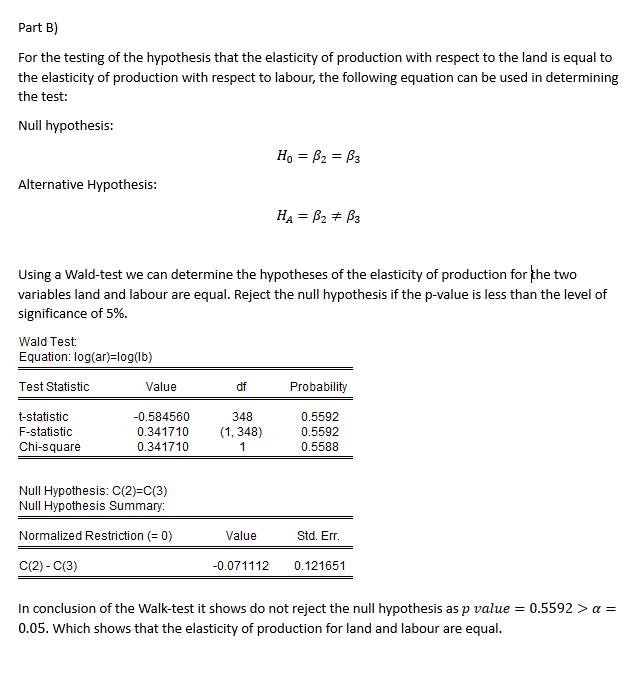Question
The State of West Bengal is one of India's largest rice producers, accounting for about 20% of rice production. Rice occupies three-quarters of the entire
The State of West Bengal is one of India's largest rice producers, accounting for about 20% of rice production. Rice occupies three-quarters of the entire agricultural area in the lower Ganga Plains. The Rice.xlsx data file includes data from 352 observations of 44 paddy farmers in West Bengal, India, between 2000 and 2007. The data file contains the following variables. Ar: hectares planted (land) Fe: kilograms of fertilizer Lb: person-days of hired and family labour Pd: tonnes of freshly threshed rice Treat the data set as one sample with N= 352 and answer the following questions.
(a) Estimate the following production function and report the results, interpret the estimates, and comment on the statistical significance of the estimates. In (Pd) = β1 + β2 ln(Ar) + β3 ln(Lb) + β4 ln(Fe) + e
(b) Using 5% level of significance, test the hypothesis that the elasticity of production with respect to land is equal to the elasticity of production with respect to labour.

Part B) For the testing of the hypothesis that the elasticity of production with respect to the land is equal to the elasticity of production with respect to labour, the following equation can be used in determining the test: Null hypothesis: Alternative Hypothesis: Wald Test: Equation: log(ar)=log(lb) Using a Wald-test we can determine the hypotheses of the elasticity of production for the two variables land and labour are equal. Reject the null hypothesis if the p-value is less than the level of significance of 5%. Test Statistic t-statistic F-statistic Chi-square Value -0.584560 0.341710 0.341710 Null Hypothesis: C(2)=C(3) Null Hypothesis Summary: Normalized Restriction (= 0) C(2) -C(3) df 348 (1, 348) 1 Value Ho = B = P3 -0.071112 HA = B = B3 Probability 0.5592 0.5592 0.5588 Std. Err. 0.121651 In conclusion of the Walk-test it shows do not reject the null hypothesis as p value = 0.5592 > a = 0.05. Which shows that the elasticity of production for land and labour are equal.
Step by Step Solution
There are 3 Steps involved in it
Step: 1

Get Instant Access to Expert-Tailored Solutions
See step-by-step solutions with expert insights and AI powered tools for academic success
Step: 2

Step: 3

Ace Your Homework with AI
Get the answers you need in no time with our AI-driven, step-by-step assistance
Get Started


